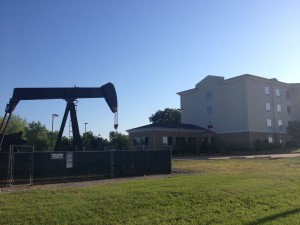If you have read this blog for any period of time, you know that local fracking and oil and gas production bans, such as the one passed by Denton voters last November, are a frequent topic of discussion. Now, the Texas Legislature has passed a bill that would prevent these type of local production bans. The bill is now on the desk of Governor Abbott for his signature.
The Bill
House Bill 40, called by many the “Denton Fracking Bill” was passed by the House (vote of 26-5) in April and by the Senate (vote of 24-7) on May 4, 2015. The bill’s stated purpose is to expressly pre-empt local attempts to regulate oil and gas activities. To read the full text of the bill, click here.
Initially, the bill deems oil and gas operations are subject to the exclusive jurisdiction of the State of Texas. Next, the bill prohibits municipalities or other political subdivisions from enacting any ordinance or law “that bans, limits, or otherwise regulates an oil and gas operation within the boundaries or extraterritorial jurisdiction of the municipality or political subdivision,” subject to a limited exception. Thus, local laws attempting to ban fracking or prohibit oil or gas production would not be permitted if this bill is signed into law.
The bill does include a limited exception that will allow local municipalities to enact laws meeting four criteria. First, the law may regulate only above ground activities such as fire and emergency response, traffic, lights, noise, and setback or notice requirements. Second, the law must be “commercially reasonable,” which is defined by the statute as allowing a “reasonably prudent operator to fully, effectively, and economically exploit, develop, produce, process, and transport oil and gas[.]” Third, the law must not effectively prohibit an oil and gas operation to be conducted by a reasonably prudent operator. Finally, the law may not otherwise be preempted by state or federal laws. Hypothetically applying this rule, a city like Denton would not be able to prohibit fracking within its city limits, but might be able to pass a law that wells be a certain distance from structures so long as the setback was commercially reasonable and did not effectively prohibit production.
Finally, there is a sort of “safe harbor” or grandfather type clause providing that a law is considered to be commercially reasonable if it was in place for at least 5 years and has allowed oil and gas operations to continue during that period. Again, hypothetically, assume that a city passed a setback requiring wells to be 500 feet from a structure in 2000, and that doing so did not prevent oil and gas production from occurring. This is the type of provision that would be deemed commercially reasonable under this clause. Suppose, however, that a city enacted a 2000 foot setback in 2000, effectively killing all oil and gas drilling in the city. This type of provision would likely not fall under the safe harbor clause and, therefore, could be deemed pre-empted by the law.
Going Forward
For now, Texas waits to see whether Governor Abbott signs the bill, which media outlets suspect he is likely to do. At that point, litigation over the legality of the law is likely.
For more information:
Here is an article by Jim Malewitz with the Texas Tribune.
The Dallas News published a great article here.
The law firm of Burleson LLP issued a client alert describing the bill, including arguments for and against.
Finally, a great summary of oil and gas controversy and legislation across the country is available here.













